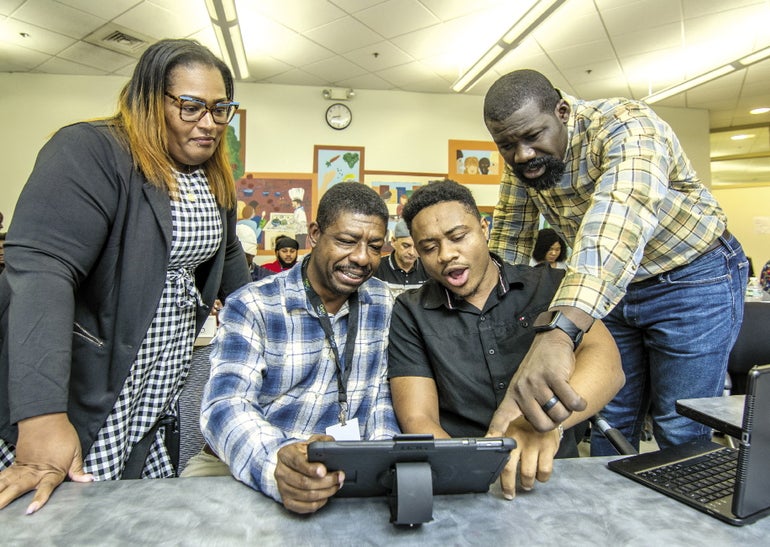As the U.S. faces an ongoing behavioral health provider shortage, one Worcester program is working to boost BIPOC representation in the mental health field.
Get Instant Access to This Article
Subscribe to Worcester Business Journal and get immediate access to all of our subscriber-only content and much more.
- Critical Central Massachusetts business news updated daily.
- Immediate access to all subscriber-only content on our website.
- Bi-weekly print or digital editions of our award-winning publication.
- Special bonus issues like the WBJ Book of Lists.
- Exclusive ticket prize draws for our in-person events.
Click here to purchase a paywall bypass link for this article.
As the U.S. faces an ongoing workforce shortage among behavioral health providers, one Worcester program is working to open pathways for immigrant and refugee BIPOC looking to enter the human services and behavioral health workforce.
The Human Services Career Support Program, a collaborative initiative between Open Sky Community Services and Seven Hills Foundation, is a five-month, paid training program offering participants guaranteed employment at one of the two Worcester human service nonprofits upon graduation.
On its fifth cohort since its inception in 2022, the HSCS program provides classroom training and internship rotations to prepare its immigrant and refugee participants, who are Black, Indigenous, and people of color (BIPOC), for entry-level, direct support roles, namely residential counselors or activity specialists.
The program is part of Open Sky’s effort to address the organization's workforce shortage and boost diversity among mental health providers in the community, especially among clinicians, said Lorie Martiska, executive vice president, chief advancement officer at Open Sky.
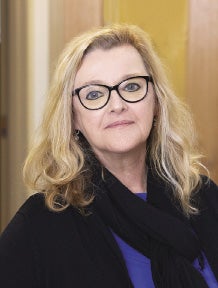
The issues of mental health workforce compression and lack of diversity are felt on both the state and national levels. The Center For Health Information and Analysis reports 78% of independently licensed clinicians in Massachusetts identify as white and independently licensed clinicians had the highest vacancy rate among behavioral health organizations surveyed at 28.5%.
The U.S. Health Resources and Services Administration says 122 million people in the United States live in a mental health professional shortage area as of Sept. 4.
“This program is absolutely transformative for the participants, but I would say it's also transformative for us as employers,” said Martiska.
Learning the ins and outs
Participants begin the program with three weeks of classroom training before entering into the first of three rotations, each separated by two weeks of classroom training. The rotations begin with shadowing staff members and advance to participants providing supervised direct care to clients. Afterward, students spend the final week of the program completing a capstone project, benefits applications, job placement, and graduation plans.
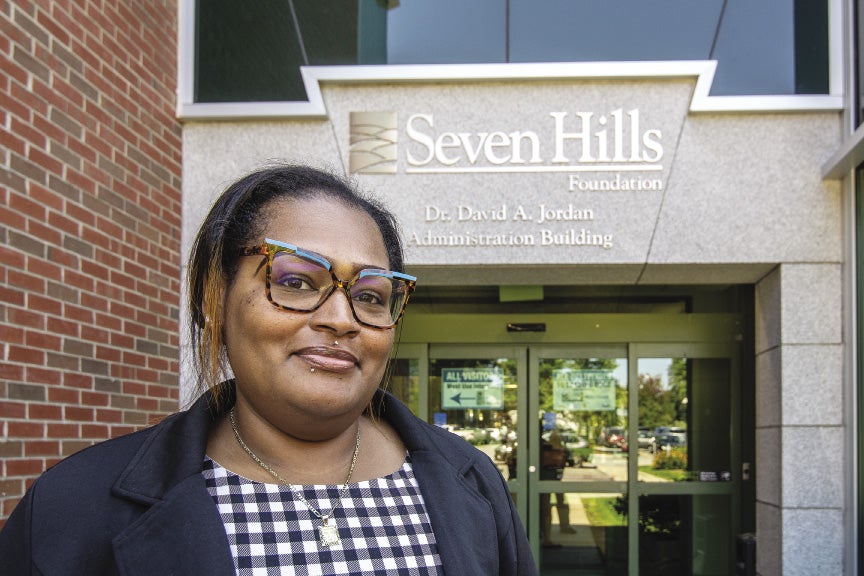
Classroom curriculum covers a holistic range of subjects needed for on-the-job duties including hands-on medical training, English courses, and lessons on professional boundaries, image, microaggressions, and understanding developmental disabilities. During their rotations, participants shadow and assist with a wide range of responsibilities, including supporting clients through community integration, money management skills, and with activities of daily living such as eating, dressing, and bathing.
Going through the HSCS program offers participants not only the ability to deliver care, but it provides a space for students to flourish on a personal level, said Tashiani Forman, Seven Hills career support and advancement navigator.
“[From] when we first meet them, to the last day when we graduate, you see a complete difference in them, personally and professionally,” she said.
‘You help you, too’
After immigrating to the U.S. from Haiti in 2022, the transition to life stateside for Joseph Casseus was anything but easy. In fact, it was so difficult that he wanted to return to Haiti, even though he was concerned about the level of violence experienced in the country.
But then, Casseus learned about the HSCS program from a friend at the warehouse where he was working. He went on to graduate from the program’s third cohort.
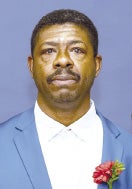
“The program changed me,” he said.
Now a residential counselor, Casseus credits the HSCS program for making him into a more confident person, an experience shared by many in the program, said Forman.
“We have people who are really within their shell when they come and afraid to speak up or have conversations,” said Forman. “And after they complete the program, that training gives them that confidence level to be open, and we just see people who wouldn't talk on day one to saying a speech at the end of the program. It's amazing.”
Today, Casseus said he has the money he needs to pay his bills and a career he’s proud of. He was able to purchase a car with the $2,000 provided to program participants in an effort to mitigate barriers that would otherwise keep them from utilizing the program. He is also Medication Administration Program certified, a frequent requirement under Massachusetts Department of Public Health regulations for direct care staff to administer medication.
Passing the MAP exam is no small feat as a report submitted to the DPH in 2022 by Lexington-based Eastern Research Group reported 33.2% of survey respondents passed the three MAP exam test components on the first try. Some Open Sky staff with exceptional English skills haven’t been able to pass the exam, said Omo Fagboore, Open Sky’s career pipeline manager.
Casseus, who is learning English, credits passing the MAP to his will.
The HSCS program has impacted the way Casseus views himself in relation to the population in which he now serves.
“I understand now, the people [with] disabilities are the same [as] me, not different. Because I see today, but I don't know tomorrow. I [could have a] disability tomorrow,” he said.
Casseus’ wife graduated from the program’s fourth cohort, and one of his sons is participating in its fifth. For Casseus, the career the HSCS program helped him achieve continues to give back.
“When you help people, you help you, too,” he said.
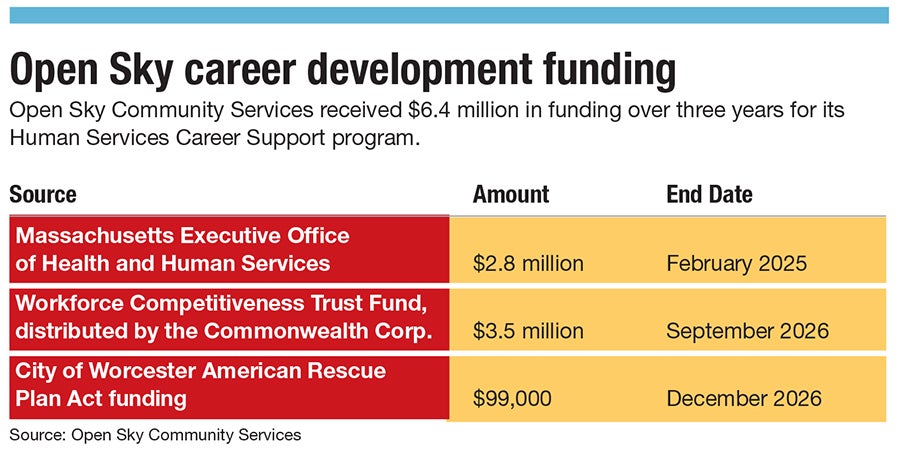
Embracing diversity
Participants come from diverse countries, and with that, comes a compilation of cultural differences the program addresses head on, said Fagboore.
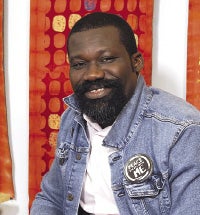
“What we've adopted in our class is to ensure that people understand and identify these differences and use that as a strength rather than being a weakness. We learn those differences and allow the members of the class to learn those cultures as well,” he said.
Included in these cultural differences are contrasting beliefs and approaches to addressing mental health. With differing norms and beliefs comes the need for support, said Forman. The program’s team is equipped with staff navigators who have the cultural competency and the trauma-informed training needed when working with populations from different cultures and backgrounds.
“We have to have that understanding that the way that other people may think of mental health and the way that we do things here in the United States is very different, but also understanding that we embrace and foster people coming into and training us as well, because we learn a lot from them,” said Forman.
When issues arise, Forman said the team addresses them immediately and provides clinical support when needed.
“Having that cultural competence, having that cultural sensitivity and humility is really important with the work that we do,” she said.
That clinical support can prove especially important when participants are going through sensitivity training, which illustrates the challenges faced by the populations students will work with.
“People get to really see firsthand what people really go through and the history of mental health. So, when we bring all of this to awareness, there's a level of trigger that that brings to people. It kind of opens the whole wound, and people now have to deal with the reality of what the individuals that will provide these services do face,” said Fagboore.
With each cohort, the program shifts and adapts as program leaders receive feedback from participants. No cohort’s curriculum has been exactly the same. Sensitivity training was not part of the inaugural cohort, but the curriculum was added in as staff identified the need to further educate participants.
“That's how you can have compassion and be able to care for somebody: understanding what they've been through,” said Fagboore.
Mica Kanner-Mascolo is a staff writer at Worcester Business Journal, who primarily covers the healthcare and diversity, equity, and inclusion industries.
